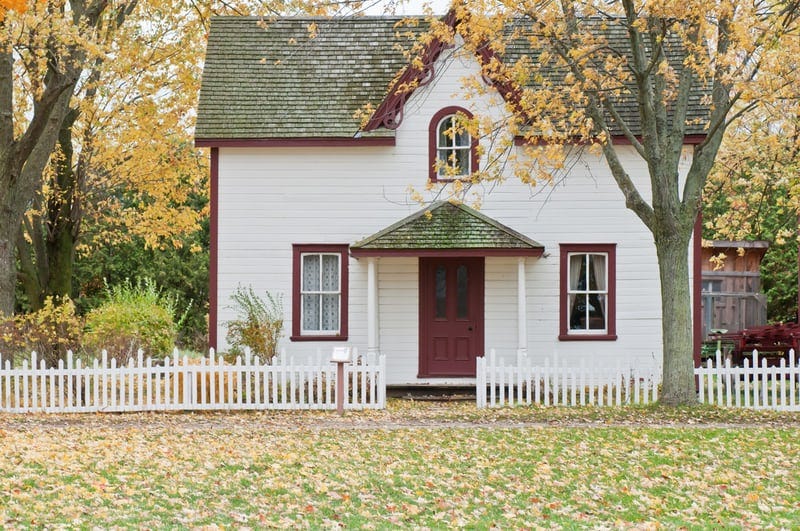The debate between real estate and stocks has been looming around in the financial world since home buying became popular and known as an investment in the early 2000’s.
Flipping houses really took off during this time and also lead to the massive pricing bubble.
Yet, eventually all good things come to an end and recessions are known to hit every 5–10 years.
The housing buying spree quickly erased its historic gains after its peak in 2006 during the Housing Crisis of ’08. Yet through it all, housing prices are now back at their all time highs, still continuing to beat out the market till today.
Real estate has a low correlation with the stock market as it historically has a high risk-adjusted rate of return meaning that it has a positive correlation with inflation.
As real estate becomes more expensive, so do the rates landlords charge towards their tenants which is a positive sign of passive income.
Upfront, there’s no doubt, real estate is more work than picking stocks. If you don’t have enough cash, don’t want to bother with a mortgage, tenants, bad credit score and pesky fees from a broker to lawyer, I would suggest looking into alternative opportunities including shares of real estate REIT or ETFs online through the market.
This is a relatively easy process, with a few clicks and with as much steak in the asset as you choose.
Compared to owning tangible properties, that requires much more sweat and tears but always reaps more rewards.
Guaranteed.

Pick Your Reward
On the other hand, Reddit investors believe they can get rich quick via the stock market so they poor all they’ve got into unprofitable stocks making it a game against hedge funds when in reality, they are loosing a lot more that they cold be gaining by just owning a property and leasing it out long term.
Despite the steep drop in 2008 due to the housing crisis, real estate has outperformed stocks over the past two decades and continues to boom during the pandemic.
Why Real Estate?
Real estate is the most tangible physical asset you can own because you can actually take care of it through remodeling and visiting your tenants. It isn’t electronic or even nonexistent like Bitcoin or Dogecoin.
It provides shelter, utility and passive stable rental income. On the other hand, stocks provide none of that and the value can disappear overnight if a scandal erupts with the CEO!
As someone who just purchased my first property to lease out to tenants in May 2020 in New York City due to the low interest and mortgage rate environment with the best vacant apartments up for grabs in the city where people are fleeing from these days, currently roughly 30% of my net worth is now in real estate while 50% are still in stocks.
Why so high in equity? I thought you didn’t like volatility and risk?
Remember, the younger you are, the more risk you can take. When you have real estate in your portfolio, it is the prime way to stay diversified. Plus if you wipe out all your gains, you have a long time horizon to recover from them so that’s why I stay bullish with passive investing within mostly index and mutual funds, mostly in growth and dividend stocks.
The rest of my portfolio is in corporate, municipal and high-yield corporate bonds, some cash and commodities of course to top it off.
I’m not an options gal especially since passive investing historically always beats out active investing so why bother!

When you are young which means less than 30 yrs young, there is no better time to do these things to maximize your wallet, growth potential and future:
-Set a split, preferably 70% growth stocks, 30% dividend stocks based on your risk tolerance: conservative, moderate or aggressive
-Invest in low cost index funds that track the major indexes ex. The S&P500 as a whole to gain exposure to both aggressive (stocks) and conservative (bonds) in order to be diversified
-If you’re really desperate, lease out a room in your house or dorm to earn extra cash on the side and start building your real estate empire
-”The best time to start is today, the worst time is tomorrow”, compounding interest is the 8th wonder of the world-open a Roth IRA with money you’ve earned to make $1m with no work by retirement
-Built at least 2–5 passive income streams (read here how to do so)
-Have an emergency savings account with up to 6–12 months of cash to cover expenses if you loose your main active source of income form your job
As stock valuations have risen during these times of high volatility as the 10-year bond and treasury yields have risen to their highest points yet since last year due to high expectations of an earlier reopening and faster economy in the months to come, this has stirred tech stocks on fire as bonds are competing against stocks in value.
The reason being is because investors are pulling less money out of safe-haven investments such as bonds and more into equities (stocks) in hopes they will do better as the pandemic fads.
Yet, I’ve become more hesitant on stocks more than ever but you never have to fear anyway as a passive investor who tracks the index as a whole. If a stock tanks in the S&P500, I’m perfectly fine because I have 499 stocks to keep me adjusted.

Real E(stay)
Although bonds do well during a recession as a cash hoard, with low interest rates in the economy currently with the Fed still keeping the Federal Funds Rate (FFR) at record lows near 0% for a few months now until inflation kicks up to 2%, I’ve got little interest in bonds as there is no high interest.
As a result, real estate is always your best bet during a recession or reonomy boom. It is a hedge against inflation. A hedge involves investing in an asset expected to maintain or increase its value over a specified period of time. That’s why real estate is considered a hedge against inflation, since home values and rents typically increase during times of inflation and tangibles along with commodities.
Why Real Estate Tops Stocks
What’s ironic is that most of the time, when an asset is less risky = less reward. More risk = more reward but also more downfall. That is the consensus for stocks but for real estate it usually not the case!
Real estate is one of the least riskiest assets because:
-Housing will always be in demand since people need to sleep somewhere
-Can use leverage and banks + government will loan out as much money as they want to a potential homebuyer or someone who wants a mortgage
-You can only borrow up to 50% of the purchase price of securities that can be purchased on margin compared to almost 100% on real estate
-Government is actively encouraging first-time homebuyers to only put down 0–3.5% down and borrow the rest through:
VA loans
USDA loans
FHA loans
-Positive consistent cash flow from renters, no volatility and sell-offs like in the market
-Mortgage rates on a 30-year fixe mortgage are at all-time lows-homeowners can refinance their mortgage, save on living expenses and finally enjoy their homes again
-Tangible physical assets won’t disappear overnight if a scandal erupts with the landlord
-Less visible volatility and highetend emotion
-During bad economic times a.k.a stock market corrections/recessions such as in March 2020, real estate holds its value
-Real estate gets impacted by a decline in stocks up to a certain point-after a correction of 30% which happened for the S&P500 alone down 32% last year. Stocks tanked but housing boomed
-Median purchase price for a home is always going up. Currently in 2021, it is $340k which is much greater than the purchase price of a stock
-Average mortgage rates are lower than average margin rates
-Tax-advantages as opposed to paying capital gains or income tax on gains on stocks
-A property can never go ‘bankrupt’ only foreclosures but still earn money. An investment can vanish overnight
Being able to borrow more and take on less risk, real estate is surely the way to go.
This also signifies that financial institutions believe real estate is less risky than stocks. With the greater purchase price and higher return, there’s no downside. You pay more to get more in return!
With higher interest rates set on the horizon once we reach herd immunity, housing prices will only skyrocket as WFH continues which has caused low inventory and skyrocketed demand.
But not everyone can reasonably afford an extra property to maintain, deal with tenants, broker fees, layers, accountants, property taxes, and the rest of the hassle that you can read here on why real estate isn’t for you.

Money in Real Estate or The Stock Market?
Since real estate is less risky than stocks, returns are actually higher which doesn’t happen with any other asset class.
Why is this so?
-Real estate investors are able to borrow more money to buy more expensive investments due to the lower risk and available loans from the bank.
-Buyers feel most confident they will earn a higher ROI (Return On Invesmtnet) compared to the purchase price
-Real estate always outperforms stocks without the hassle and day trading FOMO
-Making money with stocks is tiring, making money through real estate through the market or physical tangible real estate is easier long term and less hassle down the road
Everything requires work upfront. If you want to see returns and earn consistent passive income to become rich and let it replace your job, you have to put in the grit, sweat and tears to either finding tenants on your own or charging a broker to get it done for you.
There’s no other way. You need to find someone to live there.
But from my own experience, it’s extremely rewarding once you’ve locked in a good rental deal for 3–5 years with a reliable good tenant that won’t damage your home, cause problems, has insurance, pays on time which leads you to keep their rate the same for as long as they stay.
Currently my tenant is an old colleague who I’ve worked with at a prior firm. He transferred companies and earned a larger salary to be able to live in New York instead of commuting from outside in the suburbs a few hours away. He is reliable and I don’t plan on raising his rate to roughly $4500 because he isn’t bothersome at all.

How Hollow Are Homes?
There is definitely no greater uptick in demand for housing than during this pandemic as people are begging to get rid of cabin fever in a tight space and want more space for themselves instead of having their bedroom as a yoga studio, office, gym, party center, work and changing station, game center, everything room!
People value space because more room = better life right?
As many companies believe that the work from home lifestyle is here to stay, at least for a couple times a week once life gets back to normal, housing will continue to always be in demand.
Even if we went back to normal life commuting M-F and rarely staying at home only to sleep and eat, housing was still up in pre-pandemic times as the median home price has gradually gone up year over year since the housing bust in ‘08.
Especially for someone my age(20), you still need protection against inflation and diversification no mater how many more decades you have to live.
With real estate, you are paying for a safety asset and consistent income you just cannot get even in an index fund since every month is a different balance.
With the average American without a trust fund, with less than $1000 in an emergency savings account in case of an emergency and unable to pay, no knowledge of markets and how to invest properly, even though no matter how much experience you have, it’s all a guessing game anyway and most shockingly, only 80% of most American’s net worth is tied up in their main property, buying another property through exchanges is even better than stocks if you cannot find the capital for a physical space.
Investing in stocks will certainly provide you more headaches, time, energy, time wasted and annoyance as day trading is not a way to truly earn big consistently. Sure, there are a few examples of investors, a.k.a most notably RoaringKitty from his GameStop puts and spreads that went all-in on their most favorite unprofitable stocks to win big, but for an every day citizens who don’t have time to take those big headwinds, passive investing through REITS is the way to go.
There’s no excuse not to get into real estate. Via the market or not.

Anger Against Real Estate
As with everything in life, there are pros and cons. Yet, I’m surprised there are many critics online that believe real estate is the worst investment.
I can partially understand why. Most people who waste their time obviously don’t have the time to do renovations, find tenants, hire brokers, etc. and believe investing is the easy way to jackpot.
Yet, 90% of millionaires and billionaires own real estate so what does that tell you?
The hard work is worth it and no matter how busy you are, you can always find the time if you really want something.
Another reason real estate may not be your favorite is because saving up for a down payment in a city where the median home price is close to a million dollars or more is merely impossible for 60%+ Americans living paycheck to paycheck.
It’s hard to take care of tenants, understand the logistics of a mortgage, negotiate and separate from mom and dad with managing tenants.
It is a daunting task that requires a lot of work upfront that most aren’t willing to sacrifice for greater rewards. Hence, they stay where they are and end up complaining.
As a student, if I was able to purchase a Manhattan apartment with 20%+ down, you are too. Maybe you didn’t aggressively save and live the stealth wealth frugal minimalist lifestyle like I did since age 10 working several jobs, but it all boils down to the what you invest and value.
Better to start now than never to catch up!

In order to buy real estate here are my basic tips:
-Save enough for at least a 20% (recommended) downpayment
-Have a good credit score so you won’t have to pay extrordinary high-interest fees on your loan
-Have a reasonable offer and search Zillow and Redfin to your advantage since they always have lower than expect price estimates
-Prove you should own the property and if its a co-op, managed by a board, you have to have a steady job no entrepreneurial side gig since that isn’t consistent each month
Due to the tighter lending standards since the financial crisis of ’08, the average credit score for those qualifying for a mortgage should average over 720 which is excellent.
Fortunately, a few months into 2020 after the pandemic hit, the average credit score for approved mortgages shot up even further to 770 as there were less defaults, missed payments and people were vigilant about their spending saving up more than they ever have in case they become unemployed or sick.
As a result, these are high expectations and with most of the country not financially literate, this is another reason you might be denied for a loan, leading you to naturally dislike real sate simply because you cannot get into it, not because it’s bad.

Remember if you can, try not to rent. There is always a -100% return on renting, unless you are living there for less than 3–5 years and saving up in the meantime to purchase a physical property.
In the meantime, happy searching! Take advance of the low interest rates while you can! The 30-year fixed rate mortgage just shot up yesterday (March 5th 2021) to almost 3% so lock in your rate now before it’s too late!

